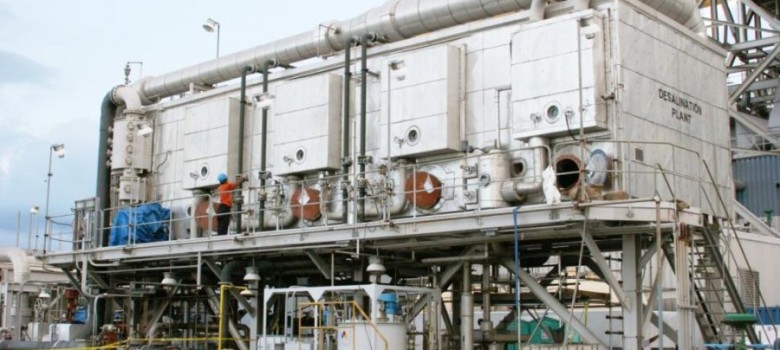
Country Profile – Israeli Desalination Plant Strategy
Israel is a leader in designing, building and operating desalination power plants. The climate in Israel is very dry with a low amount of rainfall, which means access to potable water is very limited. Due to its geographical location, Israel has an abundance of salt water that it can covert using desalination into drinkable water. In addition the country also has access to cheap supplies of coal, oil and gas, which makes the desalination process cost effective.
In 1999, the Israeli Government initiated a long term, large-scale desalination program based on reverse osmosis technology. The reason for this decision was due to large periods of droughts during the mid 1990s. Having gone through a requirements phase, it subsequently revisited targets and decided to push for fresh water capacity of 750 million m3 by 2020.
Summary of Key Facts – Hadera Desalination Plant
As of 2012, desalination contributes 349 million m3 of potable water to Israel, with the Hadera plant currently providing the largest amount (127 million m3), which is currently about 20% of the total requirement. This plant which was completed in December 2009, is to date the largest salt-water reverse osmosis (RO) plant in the world. However another RO plant is currently being built at Sorek, Israel and when complete (end of 2013), will overtake Hadera as the biggest in the world.
The Hadera plant is about 50km from the capital Tel Aviv and situated along the Mediterranean coast. It has the ability to produce about half a million cubic metres of potable water per day. The plant takes in seawater that is firstly pre-treated, and is then pushed through fine pored membranes under high pressure. In post-treatment water is adjusted for pH levels to make sure it is suitable for drinking.
The plant supplies water at a cost of $0.57 per cubic metre. It is operated by IDE Technologies and Shikun & Binui, for a period of 25years.
Hadera Desalination Plant and the Environment
The Hadera plant uses significant amount of electricity, with most of this energy being supplied from the nearby Orot Rabin coal fire powered station. From this point of view, the desalination plant doesn’t get a high score for environmental sustainability. However the plant uses state of the art technology and energy recovery systems, which mitigate the fossil fuel supplied electrical energy.
Hadera desalination plant uses the latest ERI PX Pressure Exchanger devices, which operate at high efficiency and also cost less electricity to run. For a similar sized RO desalination plant these PX devices reduce energy cost the exchanger used by approximately 60% (700MW) and saves an equivalent 2.3m tonnes of CO2 per year.
The desalination plant can be further improved by making sure electrical energy is sourced from renewable technologies. A Solar PV farm would complement a desalination plant very well, as shown by similar projects being operated in Saudi Arabia.












Dear Sirs,
In November I will visit Israel with a delegation from Papua (Indonesia) to visit the agriculture technology, which we are very interested to see. On this course I would like to visit your plant with this delegation. If there is any possibility for you to show us the site I would be very happy.
The delegation consist of the Governor and Mayor of Arfak, from Manokwari, Papua, Indonesia
I look forward to hear from you.
Brachot.
Dr. Ir. Hendrik F. Wieland
Sirs
My wife and I are planning to visit Israwl towards the end of April, 2018. We would very much like to visit a desalinization plant, either yours or another. I am seeking a way to arrange such a visit, but finding it difficult to learn how it might be done. I should appreciate your providing information or a contact which might help us with a visit.
Thank your for your assistance.
Barry Perlman, MD
Sirs:
My wife and I are planning to visit Israel at the end of April, 2018. During our visit we would very much like to visit either your plant of the desalinization plant in Ashkelon. I am finding it difficult to learn how such a visit may be scheduled. Any information or contact you might provide which could assist us would be appreciated.
Thanks
Barry Perlman, MD
Hi Barry,
Unfortunately you will need to contact the Hadera Desalination plant directly.
Why do you burn fossil fuels when you have the Sun?